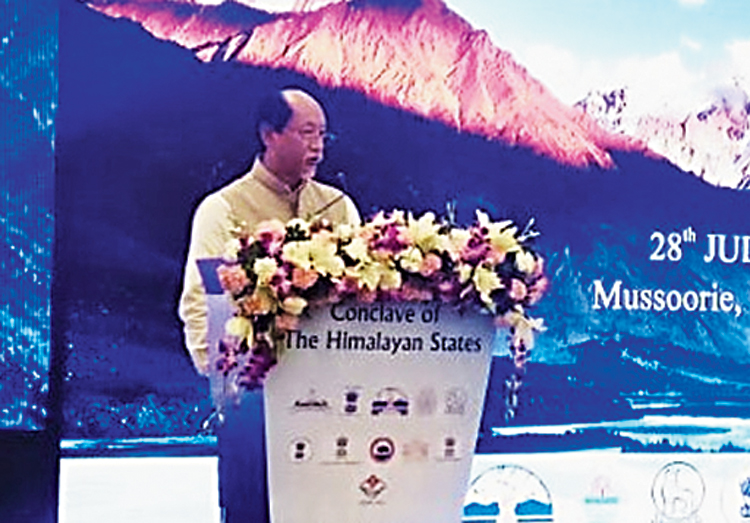States like Nagaland, which are generally revenue deficit, will not benefit from the proposed increase in the share of taxes of states from 42 per cent to 50 per cent, Nagaland chief minister Neiphiu Rio said.
Rio was sharing his views on the devolution principles of the finance commission at the conclave of the Indian Himalayan region states at Mussoorie in Uttarakhand on Sunday, a chief minister’s office release said on Monday.
He said the state would still remain revenue deficit even after an increase in share of taxes.
“In fact, it will only result in a corresponding reduction in revenue deficit grant. Since the share of taxes tends to vary depending on actual collections, we have the apprehension that our receipts may fall below estimates even more than what it is now. My state has experienced negative receipts every year of the 14th finance commission period,” he said.
Rio supported the proposal for increase of the state’s share of taxes. He suggested that more benefit will accrue if the commission agrees to fully cover the revenue deficit and also provide funds for critical needs so that the infrastructure and developmental deficit are effectively addressed.
He explained how the manufacturing sector in the state was contributing a substantial amount of Rs 14,123 lakh to the state’s economy, comprising 6.09 per cent of the gross state domestic product (GSDP) up to 1997-98. He said this suddenly dropped to Rs 6.402 lakh in 1998-99 and then to Rs 3,362 lakh in 1999-2000 shrinking to 1.32 per cent of the GSDP.
Rio said this is attributed to the judgment of the Supreme Court in writ petition (civil) 202 case dated December 12, 1996, in the T.N. Godavarman vs Union of India and others against felling of trees in the Northeast.
He said the manufacturing sector in the state, which was somehow emerging in the form of saw mills, plywood and veneer mills and furniture-making units, could never make a comeback. He said it hardly adds about 1 per cent to the state’s economy till today.
“This is the price paid by the state for the sustenance of the forest cover at the behest of the nation,” Rio said.
He lamented that it has, however, never been accounted for or compensated by any of the finance commissions or the Centre.
“Conservation and preservation of the ecosystem is not without cost and this can only be understood by the people who pay the price. Their voices have, therefore, to be heard with patience and understanding and appropriately redressed,” Rio said.
He suggested that since the conclave was being held on the common uniting ground that the participating states fall under the Indian Himalayan region, it would be more appropriate to replace the phrase “special category states” with “Indian Himalayan region states” in the proposed joint memorandum to the 15th finance commission.
Rio said the memorandum should also include appeals for consideration of the problems and issues faced by these states on the basis of being hilly and mountainous and their contributions to the country’s ecology, environment and forest cover and for being international sentinel border states toward the security concerns of the nation.
He also urged the Centre and the 15th finance commission to take into consideration the various challenges faced by the Himalayan states while allocating funds.
Rio said the mountainous and hilly Himalayan states of the country face various challenges because of its topography, harsh terrain and a number of other factors which contribute to development disability.
Rio reminded that the most important fact is that the hilly and mountainous states of the country are the sentinels of border security for the nation as all share sensitive international border with Pakistan, China, Myanmar and Bangladesh, which pose military and demographic security threats especially to the Indian Himalayan region states and the country.
“All Himalayan states provide innumerable ecosystem services to the nation like climate regulation and carbon sequestration as well as act as the water tower of the country and therefore, special attention should be given by taking these factors into account,” he said.










